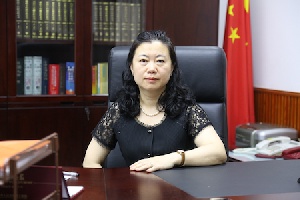Following its accumulated balance of foreign exchange reserve (FOREX) of over US$4 trillion, China’s government, in a bid to reduce the FOREX, releases funds to its local industry players to invest abroad, a Chinese professor has said.
Professor Sun Qiming of the Beijing University of Posts and Telecommunications shared that the government’s move is to enable it continue to open up the country by empowering its people to expand their businesses and plough back profits to continue to expand the Chinese economy.
Doubling its FOREX by US$2 trillion from US$2 trillion in 2010 to US$4 trillion at the end of 2012, the professor said the country targets a foreign exchange reserve of US$6 trillion by the close of 2014, explaining that since China started opening up in 1978, it has been maintaining a constant growth rate.
Lecturing on the topic ‘The Economic Development of China’ at a seminar for some invited press officers and journalists from English-speaking African countries at the China Youth Centre for International Exchange in Beijing, Professor Sun Qiming said the economy of China took off in 2000 “and the Chinese economy has maintained a growth rate of between 6 and 7% since then in spite of any challenges or shocks.”
The success story of China, he lectured, was the solid economic foundation The People’s Republic of China (PRC) laid some 30 years ago, mentioning that with just 7% of arable land they can be proud of producing enough and to feed about 22% of the world’s population.
Lying second behind the USA and pushing Japan to third in 2010, China’s Gross Domestic Product (GDP) as at 2012 stood at US$50 trillion from US$300 million in 1978. The country’s GDP is expected to close at US$60 trillion in 2016.
Professor Sun said, “Thirty years ago, China was like Africa; we capitalised on what we could do better and invested our all in that venture. We used glaciers to grow our crops and we still do. Food production was more pressing to us and so we produced more than enough and continued to export more of what we had to accumulate wealth to grow.”
Aside agriculture, China, the Professor said, has been investing greatly in its manufacturing sector, which has also largely brought the country huge foreign cash inflows, and the tourism sector, he added, is also contributing to the economic growth of the country.
With the huge foreign reserves at its disposal following the country’s reforms and opening up, China’s difficulty, he hinted, is the trade imbalance it continues to face from the developed countries like Japan and USA, who have been reluctant in selling their hi-techs to China.
He said, “We have this huge FOREX sitting in our coffers and ready to spend on our needs from the developed countries but they don’t want to sell what we need to us. China can, therefore, not watch the reserve sit down and yielding us nothing, hence the government’s decision to be releasing funds to its local business groups to invest abroad.”
The PRC, he said, would not humble itself to any foreign pressures; thus while the foreign trade imbalances persist, the country would continue to invest in its people to trade abroad and support countries to also grow.
In spite of the economic feats of China, the Beijing University Professor maintained that the country is a developing one unlike the USA, Japan and Germany, which are developed countries, defending that the cities and countryside are uncoordinated in development and standard of living.
Lastly, he said, “Notwithstanding how great the outside world sees us as being on the same pegging with the USA, Japan and Germany, our per capita GDP rating is 86th and that’s why we want to keep a low profile but take our chances as and when they come.”
Business News of Monday, 4 August 2014
Source: The Finder













